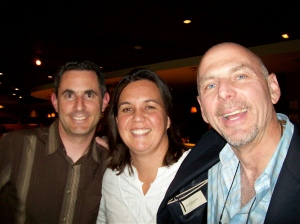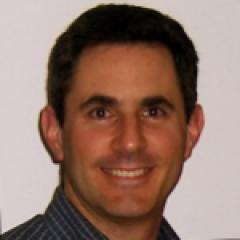Voice and Vision
Teacher voice is a concept that is central to my work, one that I’ve tried to immerse myself in for years, but in a webinar today I began to think we need an expanded concept: voice and vision.
Bill Ferriter, The Tempered Radical, is one of my favorite people to read, listen to, and talk to about these issues. We first met in a virtual space, the Teacher Leaders Network, and then cemented a virtual camraderie by meeting in person at some conferences. Bill was the most influential person in pushing me towards blogging, (and he’s also someone you should follow on Twitter).
In today’s Connected Educator webinar session, “Beyond Top-Down: Teacher-Led Change,” an important question came up regarding teacher interactions with policy makers: are we token participants among influential people who simply want to show they’ve listened to us, or are we actually playing a role and exerting some influence of our own? Can we make a difference?
In the context of the discussion, I think the question was originally about individual teachers. I think there are some individuals who are able to exert some influence on their own. Teachers of the Year might have an “in”. Some teachers just happen to know their legislators – maybe more likely in rural areas? Some teachers just have the personality and skill set to inject themselves into the policy arena.
Bill Ferriter fears that in most instances where policy makers appear interested in hearing from us, we’re actually window dressing. It’s not hard to come up with examples in policy, public forums, and the media, of times when teachers are omitted from education discussions. The Common Core State Standards were crafted almost entirely by non-teachers. NBC’s Education Nation (in its first version) was a high profile failure. The New York Times online just recently posted a “Room for Debate” topic on evaluating school performance, and published nine responses. Only one of those nine came from someone who actually is at a school full time, and she’s an incoming high school freshman.* No teachers. No principals.
I think the key is that teachers must not speak with policy makers strictly as individuals. At the other extreme we have the state union, which certainly plays an influential role in policy and politics, even beyond education. But my hope is that there’s a sweet spot in the middle, where teachers, neither isolated nor lumped into the mass of a the full state-level union, can speak about education policy and practices and be influential, not just politely listened to. That’s part of the mission of Accomplished California Teachers, after all.
So, there’s an issue of critical mass, and then, I suppose, of consistency in the message. But what is the message? That’s where my thinking about teacher “voice” shifted a bit today. I think in the future, I’ll try to think of “teacher voice and vision” – because I think we need to shift the narrative, and describe what we’re after, not just react to what’s out there already. That vision can be partly hypothetical, but we need to ground it in the best practices we know and can find right now as well. And how do we do that? We need to be connected.
Online networking provides a powerful tool to help us learn and connect, to find the pieces that work, the ones we can try ourselves. We need to share our successes, and our struggles, and we need to be well-informed about education beyond our own room or site.
Another webinar participant, Shelly Blake-Plock, raised the stakes on that question, asserting that teachers have a compelling professional responsibility to be connected. He described a number of crises in public education, including corrosive policies and high teacher turnover, and argued that professional educators have responsibility to be online, connected, aware, involved. In a challenge to educators, he asserted that that it’s not acceptable to just be casual about teachers learning and connecting online at their own languid pace, simply staying in their comfort zones.
Bill Ferriter raised an interesting idea at that point, suggesting that teachers may be hesitant about radical changes in practice because of their lack of power in the system. From within the classroom, Bill suggested most teachers “hands are tied. We’re bound by restrictions and authority over us.”
Shelly responded, “I hear the frustration, but I don’t back down” from the argument. If you’re going to stay in the career, what’s the point of teaching? We can’t be defined by the bureaucracies we exist in. If it’s that limiting and frustrating to be in the system, we have to make some conscious changes to get out or break it up.
So, breaking it up is all well and good, if you have an idea what you’re offering instead. I’m inspired by people like Lori Nazareno and Barnett Berry (in the photo at right). Lori helped start up a teacher-led school in Denver, the Math-Science Leadership Academy (see video, below). Barnett runs the Center for Teaching Quality, which contributed some excellent Teacher Solutions reports and the book Teaching 2030 to the national policy discussion. ”Voice and vision” is going to be my new mantra in trying to bring about teacher-led change. It’s not that I’ve neglected to write about a vision for better teaching, better learning, or better schools. But I’ll challenge myself, and welcome my readers to challenge me, to always include that vision when I take the time to raise my voice. If we can work together on that, my fellow teachers, we might be more than window dressing in the halls of power and policy making.
As Bill would now ask, does that make sense?
* Note: the student in the New York Times piece was describing the powerful learning that occurred when she was taught by ACT member Laura Bradley, whose eighth graders wrote novels as part of their studies last year.
Math Science Leadership Academy video:
This blog post has been shared by permission from the author.
Readers wishing to comment on the content are encouraged to do so via the link to the original post.
Find the original post here:
The views expressed by the blogger are not necessarily those of NEPC.

